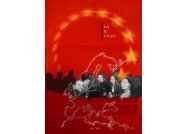turkish-greek civic dialogue - AEGEE Europe
turkish-greek civic dialogue - AEGEE Europe
turkish-greek civic dialogue - AEGEE Europe
You also want an ePaper? Increase the reach of your titles
YUMPU automatically turns print PDFs into web optimized ePapers that Google loves.
A self-conception as an EU candidate would, for example, activate representation<br />
of Greece as a fellow <strong>Europe</strong>an country that is competing with but not hostile<br />
towards Turkey, and discourses of national interest that stress the economic<br />
and security benefits of the peaceful resolution of disputes. Within such a selfconception,<br />
the adoption of <strong>Europe</strong>an norms does not need to be justified on the<br />
instrumentalist grounds of the benefits of future membership. Therefore, the<br />
EU’s perceived ambivalence towards Turkey’s membership would not discredit<br />
this alternative discourse. Turkey would seek to achieve <strong>Europe</strong>an standards in<br />
its foreign relations because they validate its international identity. Similarly,<br />
a self-conception as a good international citizen would strengthen discourses<br />
of national interest that stress international collaboration and setting a good<br />
example for the international community. Of course, exposing these alternative<br />
possibilities is the task of the critical theorist; however, how to make these<br />
alternative possibilities the prevalent realities is another matter.<br />
In some areas such as human rights and the environment, non-governmental<br />
organisations have become actors in and of their own right. Though lacking<br />
in military and economic power, their influence stems from one important<br />
resource they have at their disposal, their power over ideas. By quickly<br />
and credibly generating politically usable information, by framing issues in<br />
innovative ways, by monitoring state behavior and holding them accountable<br />
to previously stated policies, non-governmental actors have been able to after<br />
the context of meanings and constraints within which governments make and<br />
implement policies.<br />
HOW CAN CIVIL SOCIETY ACTORS MAKE A DIFFERENCE<br />
IN TURKISH-GREEK RELATIONS?<br />
I believe that the most effective way civil society actors in Turkey and<br />
Greece can help generate meaningful change in Turkish-Greek relations is<br />
by articulating and propagating an alternative discourse on international<br />
relations within their own countries. Even though there are strong challenges<br />
to mainstream thinking in both Turkey and Greece, these suffer from not being<br />
articulated within a coherent discourse.<br />
Critical arguments become trapped in a real politic discourse of power, gain/<br />
lose, and self-help, which makes it all too easy to frame the new proposals as<br />
concessions and betrayals. If these critiques voiced within a coherent alternative<br />
discourse, embodying a new vocabulary to represent the new conceptions of<br />
Association des Etats Généraux des Etudiants de L’<strong>Europe</strong><br />
state identity and national interests, then they are less vulnerable to silencing<br />
and marginalization.<br />
Discourses are linguistic structures though, which actors represent social<br />
realities. They are the shared sets of vocabulary available to actors in describing<br />
and making sense of the world out there. Actors employing these linguistic<br />
structures are not conscious of the full ramifications of their meanings.<br />
They use them because it is commonplace, because it is the only vocabulary<br />
available to them. ‘The Ozone hole’, for example, is a widespread phrase used<br />
to describe the thinning of the ozone layer in the atmosphere. We continuously<br />
use it, not contemplating on the implications of our choice of that phrase<br />
in place of for example, ozone depletion. However, the phrase ‘ozone hole’<br />
conveys a sense of urgency, catastrophe, a damage that cannot be undone,<br />
while ‘depletion’ is probably a much more scientifically accurate description<br />
of the phenomenon, though rendering the process less immediate. I do not<br />
know who originally coined this phrase, or whether he or she was conscious of<br />
its likely effects. Regardless, its effectiveness in galvanizing public opinion and<br />
prompting international action cannot be denied.<br />
An example of effective discursive innovation in Turkish-Greek relations that<br />
comes to my mind is the recently coined phrase ‘Ege’nin iki yakası’ (“two sides<br />
(collars) of the Aegean”). It immediately resonates with the Turkish proverb<br />
‘İki yakası bir araya gelmek’ where the coming together of ‘yaka’s means<br />
prosperity. Each time Turkey and Greece are referred to as “Egenin iki yakası”,<br />
what is implied is that they have to come together and be one.<br />
In addition to such discursive innovations, another way in which civil society<br />
actors can alter the context in which governments make and implement policies<br />
is by providing credible and politically usable information. For example, a<br />
website that keeps track of hate speech in the media of both sides building on<br />
the success of the Hate Speech in the Balkans project, by officials, dog fights<br />
in Aegean, and simultaneously records good gestures, positive representations,<br />
and meeting such as this. Hate speech is a controversial term for speech<br />
intended to degrade, intimidate, or incite violence or prejudicial action<br />
against someone based on their race, ethnicity, national origin, religion, sexual<br />
orientation, or disability.<br />
This would not only be a reliable source of information for researchers, but<br />
also strategically present the information in such a way that it will be easy to<br />
Rebuilding Communication<br />
49







